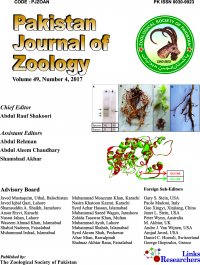1Key Laboratory of Adaptive Evolution and Ecological Conservation on Plants and Animals in Southwest Mountain Ecosystem of Yunnan Higher Education Institutes, School of Life Sciences, Yunnan Normal University, Kunming 650500, People’s Republic of China
2Yunnan College of Business Management, Kunming, 650106, People’s Republic of China
* Corresponding author: zwl_8307@yahoo.com
ABSTRACT
Physiological adaptations of mammals were the major strategies in response to the changing food resources. In order to investigate the physiological responses to fasting and refeeding in Apodemus chevrieri, body mass and body fat mass, resting metabolic rate (RMR), organs morphology, serum leptin levels and food intake were measured in the present study. The results showed that food deprivation decreased body mass and body fat mass. After refeeding, body mass can not be returned to the control value on refeeding 12 h, and it returned to control level on refeeding 7 days, but body fat mass can not be restored to the control level on refeeding 7 days. RMR and mass of liver decreased significantly in fasting groups, which can return to the control level after refeeding. Fasting for 12 h decreased serum leptin levels, and leptin levels can not recover to the control level after refeeding. Interestingly, there were no post-fasting compensatory increases in food intake. All of the results indicated that A. chevrieri can adjust their physiological functions to cope with food shortage, mainly by decreasing body mass, thermogenesis and serum leptin levels.
To share on other social networks, click on any
share button. What are these?










